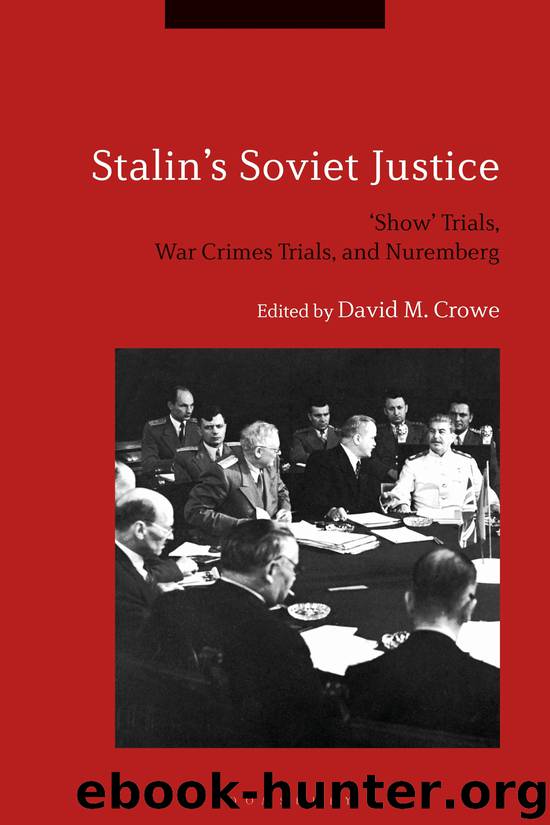Stalin's Soviet Justice by David M. Crowe;

Author:David M. Crowe;
Language: eng
Format: epub
Publisher: Bloomsbury UK
4
The Human Face of Soviet Justice? Aron Trainin and the Origins of the Soviet Doctrine of International Criminal Law
Valentyna Polunina
On July 16, 1938, six hundred legal scholars, academics, and legal practitioners from different regions of the Soviet Union gathered in Moscow for the “First conference on the doctrine of the Soviet state and law.” The meeting was organized by Andrey Vyshinsky, the head of the Institute of State and Law in the Soviet Academy of Sciences and state prosecutor in notorious Stalin’s Moscow trials, with the ambitious goal of adopting a unified Marxist-Leninist-Stalinist vision of Soviet legal doctrine. The new theory of Soviet law was to replace the approaches and concepts of earlier Soviet jurists, which had been branded as “hostile” and “anti-Marxist.”1 For instance, Vyshinsky condemned the idea of Evgeny Pashukanis that once the state of communism was achieved, law and the state would wither away. Instead, morality was supposed to be a replacement.2
In his speech, Vyshinsky introduced a new official definition of law, while other approaches to law were declared to be “wrecking.” Vyshinsky defined law as “a set of rules of behavior . . . that express the will of the ruling class as well as . . . the customs and rules of coexistence, authorized by the state, the application of which is guaranteed by state power in order to protect, consolidate, and develop the public relations and orders beneficial and acceptable for the ruling class.”3 This definition shows that Vyshinsky understood law as a coercive instrument in the hands of state that was to be used for the regulation of human behavior. At the same time, Vyshinsky, like many of the earlier legal scholars he had criticized, forgot to mention that Marx and Lenin had themselves rejected the idea of a new proletarian or socialist law which would wholly replace capitalist law in a socialist society.
Vyshinsky introduced a concept new to Soviet legal thought—“a branch of law.” Among the branches of law that received official sanction, like administrative or criminal law, a special role was given to the Soviet doctrine of international law due to the complicated geopolitical constellation of the Soviet state “in capitalist encirclement.”4 One of the most important topics for analysis was the notion of aggression that, claimed Vyshinsky, “had first been defined by Soviet diplomats.”5
Vyshinsky also called for more attention to aspects of criminal law such as issues of guilt, complicity, and the legal instrument of analogy. They would later prove to be useful, not only during the Soviet but also during the Allied and international war crimes tribunals.
Vyshinsky’s vision of how Soviet legal doctrine should evolve was distributed throughout the Soviet Union. Just a week after the conference, parts of his speech were reprinted in Pravda under the title “About the tasks of the Soviet socialist law science.” From then on, the Soviet government would elaborate a practical approach to international law and criminal justice; international trials were seen as a good opportunity to present the benefits of a communist state to the world.
Download
This site does not store any files on its server. We only index and link to content provided by other sites. Please contact the content providers to delete copyright contents if any and email us, we'll remove relevant links or contents immediately.
| Africa | Americas |
| Arctic & Antarctica | Asia |
| Australia & Oceania | Europe |
| Middle East | Russia |
| United States | World |
| Ancient Civilizations | Military |
| Historical Study & Educational Resources |
The Sympathizer by Viet Thanh Nguyen(4096)
The Rape of Nanking by Iris Chang(4024)
World without end by Ken Follett(3347)
Ants Among Elephants by Sujatha Gidla(3282)
Blood and Sand by Alex Von Tunzelmann(3060)
Japanese Design by Patricia J. Graham(3004)
City of Djinns: a year in Delhi by William Dalrymple(2436)
Foreign Devils on the Silk Road: The Search for the Lost Treasures of Central Asia by Peter Hopkirk(2389)
Inglorious Empire by Shashi Tharoor(2347)
The Queen of Nothing by Holly Black(2324)
In Order to Live: A North Korean Girl's Journey to Freedom by Yeonmi Park(2304)
India's Ancient Past by R.S. Sharma(2303)
Tokyo by Rob Goss(2294)
India's biggest cover-up by Dhar Anuj(2249)
Tokyo Geek's Guide: Manga, Anime, Gaming, Cosplay, Toys, Idols & More - The Ultimate Guide to Japan's Otaku Culture by Simone Gianni(2243)
The Great Game: On Secret Service in High Asia by Peter Hopkirk(2231)
Goodbye Madame Butterfly(2163)
Batik by Rudolf Smend(2009)
Living Silence in Burma by Christina Fink(1985)
